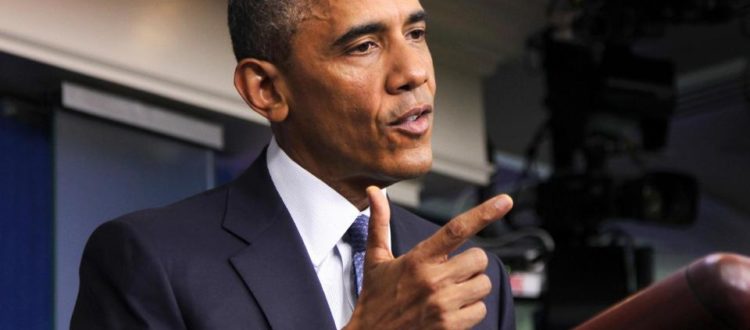Obama crafts legal rationale for immigration steps
Published on August 28th, 2014
Josh Lederman
August 27, 2014
AP
WASHINGTON (AP) — The White House is crafting a blame-it-on-Congress legal justification to back up President Barack Obama’s impending executive actions on immigration.
Facing an expected onslaught of opposition, the administration plans to argue that Congress failed to provide enough resources to fully enforce U.S. laws, thereby ceding wide latitude to White House to prioritize deportations of the 11.5 million people who are in the country illegally, administration officials and legal experts said. But Republicans, too, are exploring their legal options for stopping Obama from what they’ve deemed egregious presidential overreaching.
A self-imposed, end-of-summer deadline to act on immigration is rapidly approaching. While Obama has yet to receive the formal recommendations he’s requested from Homeland Security Secretary Jeh Johnson, administration officials said the president is intimately familiar with the universe of options and won’t spend much time deliberating once Johnson delivers his recommendations.
After resisting calls to act alone in hopes Congress would pass a comprehensive immigration fix, Obama in June bowed to immigration activists and said that “if Congress will not do their job, at least we can do ours.” The most sweeping, controversial step under consideration involves halting deportation for millions, a major expansion of a 2012 Obama program that deferred prosecutions for those brought here illegally as children.
Roughly half a million have benefited from that program, known as Deferred Action for Childhood Arrivals or DACA.
 But while prosecutors are routinely expected to use their discretion on a case-by-case basis, such blanket exempting of entire categories of people has never been done on the scale of what Obama is considering — potentially involving many millions of people if he extends relief to parents of DACA children, close relatives of U.S. citizens or immigrants with clean criminal records.
But while prosecutors are routinely expected to use their discretion on a case-by-case basis, such blanket exempting of entire categories of people has never been done on the scale of what Obama is considering — potentially involving many millions of people if he extends relief to parents of DACA children, close relatives of U.S. citizens or immigrants with clean criminal records.
“The question is how broadly can the president extend the categories and still stay on the side of spectrum of ensuring the laws are faithfully executed?” said Cristina Rodriguez, who left the Justice Department’s Office of Legal Counsel in 2013 to teach at Yale Law School.
Other options under consideration, such as changes to how green cards are distributed and counted, might be less controversial because of the support they enjoy from the business community and other influential groups. But Derrick Morgan, a former adviser to Vice President Dick Cheney and a scholar at the conservative Heritage Foundation, said Obama will still face staunch opposition as long as he attempts an end run around Congress.
Obama’s goal had been to announce his decision around Labor Day, before leaving on a trip next week to Estonia and Wales. But a host of national security crises have pushed the announcement back, likely until after Obama returns, said the officials, who weren’t authorized to comment by name and demanded anonymity.
 Obama’s actions will almost surely be challenged in court.
Obama’s actions will almost surely be challenged in court.
“Any potential executive action the president takes will be rooted in a solid legal foundation,” White House spokesman Shawn Turner said.
What’s more, Obama may have undermined his case because he has insisted time and again that he’s the president, not the king, and “can’t just make the laws up by myself.” In a 2012 interview with Telemundo, Obama defended his decision to defer deportations for children but said he couldn’t go any bigger.
“If we start broadening that, then essentially I would be ignoring the law in a way that I think would be very difficult to defend legally. So that’s not an option,” he said then.
Republicans are already hinting that they’ll consider legal action to thwart what they’ve denounced as a violation of the separation of powers. House Speaker John Boehner, R-Ohio, in a conference call this month with GOP House members, accused Obama of “threatening to rewrite our immigration laws unilaterally.”
“If the president fails to faithfully execute the laws of our country, we will hold him accountable,” Boehner said, according to an individual who participated in the call.
The House already has passed legislation to block Obama from expanding DACA and, through its power of the purse, could attempt to cut off the funds that would be needed to implement the expansion. House Republicans could also consider widening or amending their existing lawsuit against Obama over his health care law, a case that both parties have suggested could be a prelude to impeachment proceedings.
___
Reach Josh Lederman on Twitter at http://twitter.com/joshledermanAP





